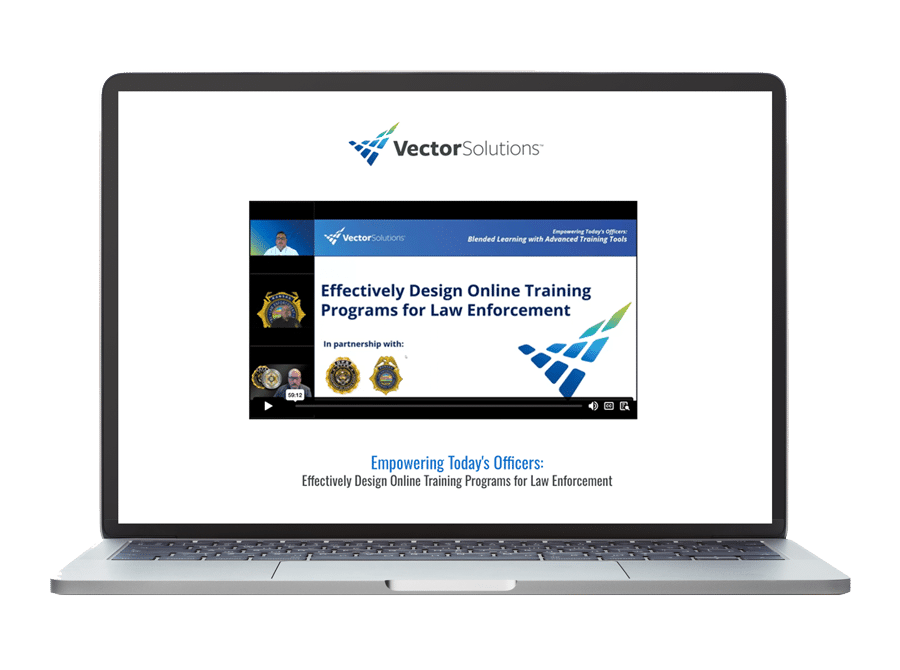September 26, 2024 7 min read

How to Effectively Design Online Training Programs for Law Enforcement
Industry:
Solution:

As a profession, law enforcement is continuously redefined by technology. What’s available to the public, what can be utilized by officers, and how criminals are taking advantage of both, all play a part in reshaping the day-to-day responsibilities of officers and the expectations placed upon law enforcement agencies by their communities.
However, beyond the tools used by officers in the course of their duties, technology also plays a significant role in how they are trained. Today, agencies have a variety of training tools available to them that would have seemed impossible just a few decades ago. From online training to virtual reality, agencies have many options to choose from when developing their training programs, but how can they be sure that these new methods are actually beneficial to their officers?
Vector Solutions, in partnership with industry experts, is examining this question in a series of webinars offering insights into the use of technology and blended training strategies in a law enforcement setting and how they can enhance training effectiveness.
In the first webinar– “Effectively Design Online Training Programs for Law Enforcement” –experts from the Utah Peace Officer Standards and Training (POST) and Kansas Law Enforcement Training Center (KLETC) shared how their agencies are utilizing online training and technology as part of their training programs. They also discussed the benefits they have experienced as a result.
Presented by Vector Solutions, the discussion was moderated by ret. Sgt. Doug Kazensky, Senior Solutions Engineer at Vector Solutions. Panelists included Alvin Sowers, Associate Director at KLETC and John Jacobs, Training Manager at Utah POST.
Effectively Design Online Training Programs for Law Enforcement
Watch On-Demand
What is online training for law enforcement?
Before delving into the ‘whys’ and ‘hows’ of incorporating any new methodology, it’s important to first define what it is. According to Jacobs, agencies shouldn’t get hung up on the idea of online courses or SCORM, and instead think of online training as any training delivered electronically.
“Sending an email the night before training with a PDF to read, that’s online training. Providing a video or providing resources after training, that’s online training,” Jacobs said. “It’s a strategy to maximize your resources and elevate your training.”
On the other hand, it’s obvious that there will always be training that cannot be provided through digital means. However, online training can still play a part by providing officers with the foundational knowledge they need prior to in-person training.
“You’re not going to learn a physical skill online, but you can learn the contextual knowledge before you actually do the skill time,” Jacobs said.
What does online training offer law enforcement and how can agencies use it effectively?
One of the benefits of online training is that it provides agencies with an avenue to effectively incorporate both synchronous learning and asynchronous learning.
“Asynchronous learning is when officers are doing training on their own time, and synchronous training is when everyone is together,” Jacobs said.
By incorporating both, agencies can allow officers to acquire the contextual knowledge they need at their own pace and then make the most of the time officers have with instructors. Additionally, delivering training online allows them to easily refer back to that information when needed.
“It becomes a library of reference for them. They get weeks away from the class, their memory will drift…[referring back to online training] re-grounds them to the contextual knowledge as they move through our programs and then also throughout their career,” Jacobs said.
Today, both the Utah POST and KLETC are utilizing online methods to deliver a portion of basic training to academy recruits and hope to increase the amount of online training they offer in the future. But how do they plan to ensure the training they offer maintains its effectiveness as they offer more and more of it online?
“We know that students prefer to ‘do’ things, but they still need a foundation. Use online training to build the foundation at their own pace and then come back and do the skills training to make sure those skills are being done correctly,” Sowers said.
Focusing on the subjects that most require the foundational knowledge prior to in-person practice can help agencies ensure they get the most out of both online training and the time spent with instructors.
According to Sowers, an additional strategy to ensure effectiveness is to provide trainees with ample opportunities to communicate and interact with their instructors.
“We’ve probably all sat down and taken an online class where they fed us material, but they never gave us a chance to ask any questions,” Sowers said. “One of the things online training has to have is interaction with the instructor…even if it’s in electronic format.”
How can law enforcement agencies get started with online training?
Once an agency has seen the benefit of online training and knows the strategies to utilize it effectively, how can they most easily incorporate it into their current training programs?
Depending on the size of the agency and the resources available, it may be possible to create quality custom online training content in-house. However, that’s not always an option, especially for agencies in smaller or rural communities.
“If you don’t already have the investment or talent in-house, it’s most likely going to be more cost-effective to go outside and purchase content,” Jacobs said.
When selecting a vendor, look for courses that are already approved by your state’s POST or certifying authority, or courses that are certified by a nationally recognized organization, like those certified as part of IADLEST’s NCP program.
Additionally, the use of a third-party training management system (TMS) often goes hand-in-hand with online training to most effectively deliver, track, and report on it. Like when selecting a vendor for online courses, choose a TMS vendor that provides software that is well-recognized in the industry and purpose-built for law enforcement.
Learn more about the use of technology in law enforcement training programs
To learn more about how your agency can incorporate new technologies into your training program, register for the other webinars in this series.
For insights on the use of virtual reality for law enforcement officers, register and watch, “Utilizing Virtual Reality for Immersive Officer Training Experiences,” on-demand, featuring Lon Bartel from VirTra, a company that specializes in the use of VR for law enforcement simulation training.
To learn about blending online and in-person training, register for “The Best of Both Worlds: Blending Online and In-Person Officer Training,” hosted live on October 9th, 2024 and featuring Kerry Avery from Odin Training Solutions and Dianne Beer-Maxwell from IADLEST.
Register Now For “The Best of Both Worlds: Blending Online and In-Person Officer Training” on October 9th at 1pm ET]

For information on technology to streamline processes, register for “Technology That Will Help Your Agency Move Away From Manual Processes,” hosted live on October 30th, 2024 and featuring Lt. Eric Benson of Portsmouth Police Department and Sgt. Thomas Assion of Mahoning County Sheriff’s Office.
Register Now For “Technology That Will Help Your Agency Move Away From Manual Processes” on October 30th at 1pm ET
Vector Solutions’ suite of industry-leading software solutions for law enforcement includes training management systems, online training courses, FTO/PTO/CTO/live skill evaluations, academy automation, and an early intervention and conduct management system.










